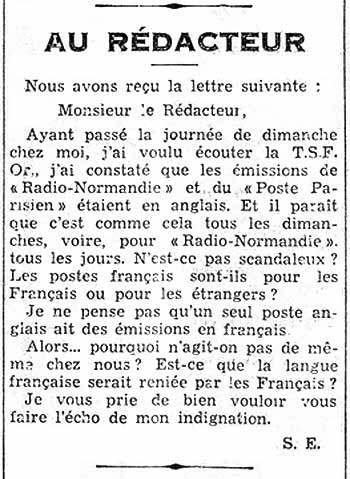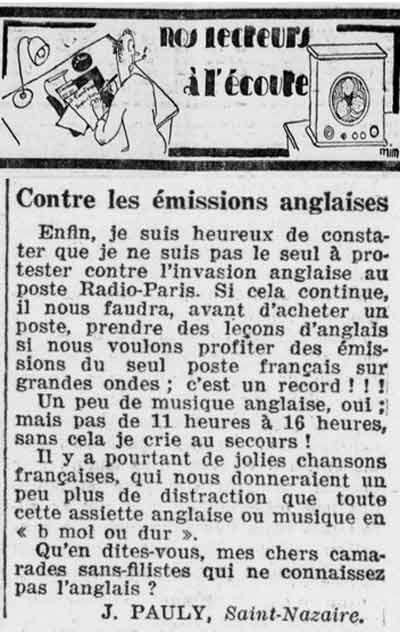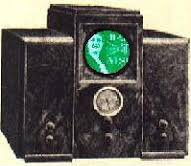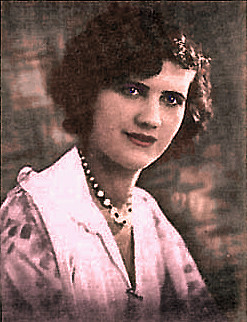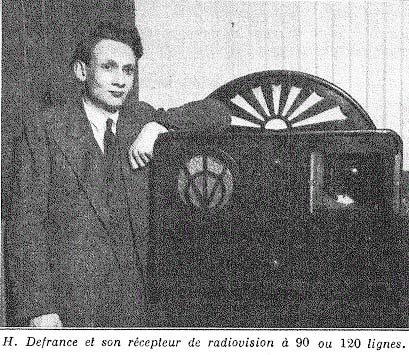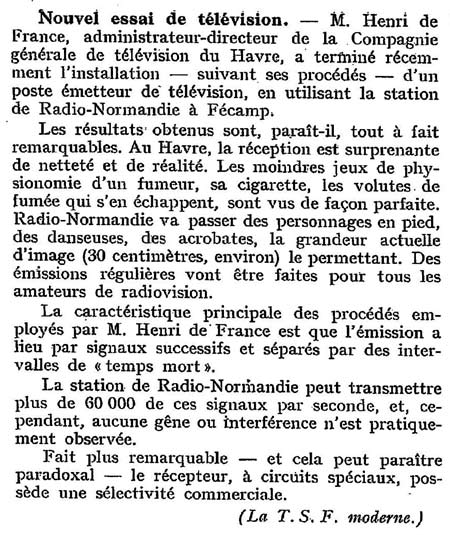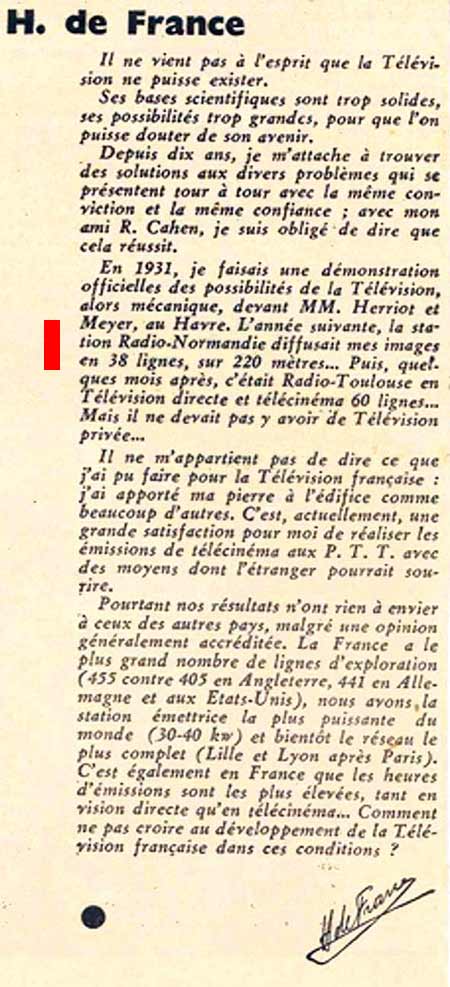Radio Normandie émettait en français pendant la journée jusqu’au soir, puis en anglais une bonne partie de la nuit. Le dimanche, les programmes anglais occupaient la majeure partie de la journée.
La publicité anglaise n'était pas négligeable mais provoquait le mécontentement tant du gouvernement anglais que des auditeurs français. Le premier était mécontent de ce que la publicité, interdite sur ses propres ondes, lui était imposée par des postes étrangers dont Radio Normandie. L'abondance de programmes anglais provoquait quelques frustrations chez certains auditeurs normands réfractaires à la langue de Shakespeare !
A ce sujet, voici un extrait tiré du livre de Jennifer Richard "L'Illustre inconnu" publié aux Editions Robert Laffont en 2014 :
 (...) Enfin, le soir, au souper, nous écoutions l’émission de Tante Francine et Oncle Roland, puis le journal de Rouen. Simone et sa mère s'asseyaient ensuite au coin du feu. Le tricot était maintenant rythmé par le programme de variétés. Bien plus qu'un accessoire de confort moderne, la radio constituait pour moi une présence inestimable. Le ronflement permanent qui en émanait m'arrachait un peu à ma solitude. En effet, contrairement aux paroles prononcées à tort et à travers par les autres, et dont je n'étais que le témoin, les mots de la radio m'étaient destinés. A I'instar de l’écran de cinéma, c'est à moi que le poste s'adressait. Pas uniquement à moi, bien sûr, mais cela n'importait pas puisqu'enfin, on me parlait. J'étais un auditeur parmi d'autres, mais j'étais là, et personne ne pouvait me retirer cela. (...) Enfin, le soir, au souper, nous écoutions l’émission de Tante Francine et Oncle Roland, puis le journal de Rouen. Simone et sa mère s'asseyaient ensuite au coin du feu. Le tricot était maintenant rythmé par le programme de variétés. Bien plus qu'un accessoire de confort moderne, la radio constituait pour moi une présence inestimable. Le ronflement permanent qui en émanait m'arrachait un peu à ma solitude. En effet, contrairement aux paroles prononcées à tort et à travers par les autres, et dont je n'étais que le témoin, les mots de la radio m'étaient destinés. A I'instar de l’écran de cinéma, c'est à moi que le poste s'adressait. Pas uniquement à moi, bien sûr, mais cela n'importait pas puisqu'enfin, on me parlait. J'étais un auditeur parmi d'autres, mais j'étais là, et personne ne pouvait me retirer cela.
La radio, qui allégeait l’humeur de la Mère Colin depuis le matin et nous la rendait supportable, émettait tout de même une fausse note à vingt-et-une heures en semaine, et dès l'après-midi le week-end. (débuts des émissions en langue anglaise)
« Et voilà, ils recommencent ! se lamentait-elle. Ils ne peuvent pas s'empêcher, hein ! On n'est plus chez nous, ma parole ! »
Et sa grosse silhouette se dandinait jusqu'à sa chambre, dont elle fermait la porte en râlant. Ce qui la désespérait à ce point, c'était le passage de relais de Radio Normandie aux Anglais. En effet, la publicité venait d'être (était) interdite à la radio en Grande-Bretagne, et le directeur de l'lnternational Broadcasting Company avait passé un accord avec le directeur de Radio Normandie pour diffuser des programmes vers l’Angleterre à partir de l'émetteur français.
Ce partage du temps d'antenne me ravissait. J'aimais me dire que nous entendions les mêmes choses, de part et d'autre de la Manche.
(Chanté en anglais) : « Radio Normandie, vous appelle...
Radio Normandie arrive...
Ici Radio Normandie, qui diffuse
sur sa nouvelle longueur d'onde
de deux cent soixante quatorze mètres ! »
Tous les soirs, la prise d'antenne par les Anglais me replongeait dans mes souvenirs. Je repensais à la guerre. J'avais l'impression de me rapprocher de mes camarades tombés dans la Somme (1916). Car ils en avaient bavé, eux aussi, emmenés par des officiers tout aussi aveugles que les nôtres.
Je parlais de déterminisme, un peu plus haut. En voici encore une manifestation ! Car ce partage d'antenne eut une influence majeure sur le cours de ma vie. J'y reviendrai. A force d'entendre Radio Normandy, je décidai d'apprendre I'anglais. A l'aide d'un manuel, d'un dictionnaire, et à force d'écouter les programmes après vingt-et-une heures, je pus rapidement comprendre la plupart des propos. Une nouvelle dimension s'ouvrait à moi ! Je pouvais désormais retenir et fredonner les chansons anglaises et américaines, et prenais un malin plaisir à les chanter à l'oreille de la Mère Colin qui ne supportait pas de se sentir le dindon de la farce.
« Félix, arrêtez cela ! protestait-elle. C'est très désagréable ! Et de toute façon, à quoi peut bien servir de parler étranger ? »
Mais le jour où j'entonnai "You Brought a New Kind of Love" (Vous avez apporté un nouveau type d'amour) de  Maurice Chevalier, qu'elle avait entendu sans parvenir à le retenir, elle me supplia de lui traduire les paroles. Maurice Chevalier, qu'elle avait entendu sans parvenir à le retenir, elle me supplia de lui traduire les paroles.
« Ah, certainement pas, Thérèse ! Voici mon dictionnaire, vous y trouverez tout ce dont vous avez besoin »
Simone s'amusait de nos querelles. Elle restait à l’écart, de plus en plus pensive et mystérieuse. (...)
Extrait de “L’illustre inconnu” de Jennifer Richard -
Editions Robert Laffont (2014) |
Radio Normandie broadcast in French during the day until the evening, then in English for most of the night. On Sundays, English programs took up most of the day.
English advertising was not negligible, but it provoked discontent among both the English government and French listeners. The English government was unhappy that advertising, which was banned on its airwaves, was being imposed on it by foreign stations, including Radio Normandie. The abundance of English programs caused some frustration among some Norman listeners resistant to the language of Shakespeare!
On this subject, here is an excerpt from Jennifer Richard's book "The Illustrious Unknown" published by Editions Robert Laffont in 2014:
(...) Finally, at suppertime, we listened to Aunt Francine and Uncle Roland's programme, and then the Rouen newspaper. Simone and her mother would then sit by the fire. Knitting was now punctuated by the variety programme. Much more than a modern convenience, the radio was an invaluable presence for me. The constant hum of the radio brought me out of my solitude. In fact, unlike the words spoken indiscriminately by others, of which I was only a witness, the words on the radio were intended for me. Like the cinema screen, the radio was addressed to me. Not to me alone, of course, but that didn't matter because at last I was being spoken to. I was just another listener, but I was there, and no one could take that away from me.
The radio, which had lightened Mother Colin's mood since the morning and made it bearable for us, still emitted a false note at eleven o'clock on weekdays, and from the afternoon on weekends. (beginning of English-language broadcasts)
"There they go again!" she lamented. They just can't help themselves, can they ? This isn't our home any more, my word !"
And her fat figure waddled off to her room, where she shut the door and grumbled. What really made her despair was the fact that Radio Normandie had been handed over to the English. Advertising had just been (was) banned on British radio, and the director of the International Broadcasting Company had made an agreement with the director of Radio Normandie to broadcast programmes to England from the French transmitter.
I was delighted with this sharing of airtime. I liked to think that we were hearing the same things from both sides of the Channel.
« Radio Normandy, calling you...
Radio Normandy coming through...
This is radio Normandy, broadcasting
on its new wavelength
of two hundred and seventy four meters ! »
Every evening, when the British took over the airwaves, I was plunged back into my memories. I thought back to the war. I felt like I was getting closer to my comrades who fell on the Somme (1916). They too had suffered, led by officers just as blind as ours.
I mentioned determinism a little earlier. Here's another example! Because this sharing of airtime had a major influence on the course of my life. I'll come back to that later. By dint of listening to Radio Normandy, I decided to learn English. With the help of a manual and a dictionary, and by listening to the programmes after nine in the evening, I was soon able to understand most of what was being said. A whole new dimension opened up to me! I could now memorise and hum English and American songs, and took great pleasure in singing them in the ear of Mother Colin, who couldn't bear to feel like the butt of the joke.
"Félix, stop that!" she protested. "It's very unpleasant! And anyway, what's the point of speaking foreign?"
But the day I sang Maurice Chevalier's "You Brought a New Kind of Love", which she had heard but couldn't remember, she begged me to translate the words for her.
"Ah, certainly not, Thérèse! Here's my dictionary, you'll find everything you need!"
Simone was amused by our quarrels. She stayed away, more and more pensive and mysterious. (...)
Excerpt from “The Illustrious Unknown” by Jennifer Richard -
Editions Robert Laffont (2014) |

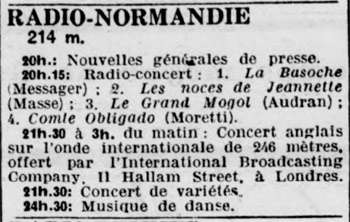
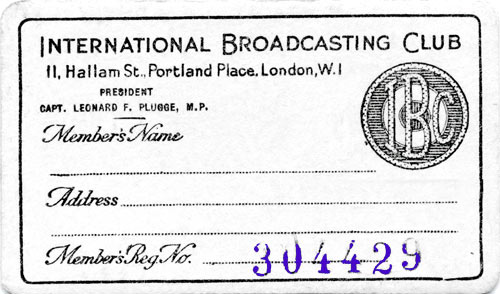

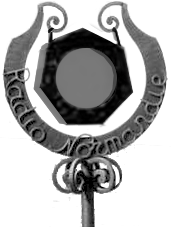
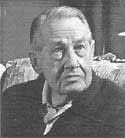 Stephen Williams raconte : "Un soir, à la station de radio, on nous a dit que nous étions en panne. Ils nous ont appelés et nous ont demandé de passer un disque en continu pour donner au technicien de quoi tester. Une heure s'est écoulée et le téléphone a sonné de nouveau. Cette fois, c'était Londres. "Vous êtes saouls là-bas ?" a demandé le capitaine Plugge. "Vous avez passé le même disque dix-sept fois de suite sans aucune annonce pour expliquer pourquoi ?"
Stephen Williams raconte : "Un soir, à la station de radio, on nous a dit que nous étions en panne. Ils nous ont appelés et nous ont demandé de passer un disque en continu pour donner au technicien de quoi tester. Une heure s'est écoulée et le téléphone a sonné de nouveau. Cette fois, c'était Londres. "Vous êtes saouls là-bas ?" a demandé le capitaine Plugge. "Vous avez passé le même disque dix-sept fois de suite sans aucune annonce pour expliquer pourquoi ?" 


